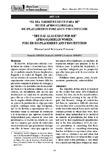Mostrar el registro sencillo del ítem
“El día también existe para mí” mujer afrocolombiana, desplazamiento forzado y prostitución
| dc.rights.license | http://creativecommons.org/licenses/by-nc-sa/3.0/ve/ | es_VE |
| dc.contributor.author | Valenzuela Tibasosa, Blanca Isabel | |
| dc.date.accessioned | 2018-06-20T01:10:44Z | |
| dc.date.available | 2018-06-20T01:10:44Z | |
| dc.date.issued | 2017 | |
| dc.identifier.issn | 1690-3544 | |
| dc.identifier.uri | http://www.saber.ula.ve/handle/123456789/44994 | |
| dc.description.abstract | El objetivo del presente artículo es reflexionar en cuanto a la realidad que viven algunas mujeres afrocolombianas que debido al conflicto armado fueron desplazadas, llegando a la ciudad de Bogotá, este cambio tan drástico de contexto las ha llevado a experimentar situaciones bastante difíciles por haber asumido la jefatura de su hogar, y que debido a la insatisfacción de necesidades básicas y la pobreza extrema en la que estaban, no encontraron otra opción que involucrarse en contextos de prostitución, para ellas no es fácil encontrar oportunidades de empleo debido al bajo nivel educativo, ejercer la prostitución es algo que estas mujeres catalogan como algo denigrante, que las ha llevado a experimentar otras situaciones como el consumo de sustancias y la delincuencia que agravan su nivel de vulnerabilidad, para conocer de cerca esta problemática se realizó un estudio de caso con tres mujeres por medio de entrevistas semiestructuradas que permitieron dialogar con ellas de temas como que significa ser una mujer afrocolombiana, las medidas de reparación integral que propone la ley de victimas para la población desplazada, y se concluye indagando por las propuestas que ellas tiene para salir de esos niveles de vulneración. | es_VE |
| dc.language.iso | es | es_VE |
| dc.publisher | SABER-ULA | es_VE |
| dc.rights | info:eu-repo/semantics/openAccess | es_VE |
| dc.subject | Género | es_VE |
| dc.subject | Etnia | es_VE |
| dc.subject | Desplazamiento | es_VE |
| dc.subject | Prostitución | es_VE |
| dc.subject | Vulnerabilidad | es_VE |
| dc.title | “El día también existe para mí” mujer afrocolombiana, desplazamiento forzado y prostitución | es_VE |
| dc.title.alternative | “The day also exist for me” afrocolombian women, forced displacement and prostitution | es_VE |
| dc.type | info:eu-repo/semantics/article | es_VE |
| dcterms.dateAccepted | 30/05/2017 | |
| dcterms.dateSubmitted | 25/03/2017 | |
| dc.description.abstract1 | The objective of this article is to reflect on the reality that some Afro-Colombian women live who, due to the armed conflict, were displaced, arriving at the city of Bogotá, this dramatic change of context has led them to experience difficult situations because they have assumed the and that due to the dissatisfaction of basic needs and the extreme poverty in which they were, they found no other option than to be involved in contexts of prostitution, for them it is not easy to find employment opportunities due to the low educational level, to exercise prostitution is something that these women classify as something demeaning that has led them to experience other situations such as substance use and crime that aggravate their level of vulnerability, to get a closer look at this problem, a case study was carried out with three women by semistructured interviews that allowed them to but what does it mean to be an Afro-Colombian woman, the comprehensive reparation measures proposed by the law of victims for the displaced population, and is concluded by investigating the proposals they have to overcome those levels of violation. | es_VE |
| dc.description.colacion | 15-27 | es_VE |
| dc.description.email | isaval2613@gmail.com | es_VE |
| dc.description.frecuencia | Anual | |
| dc.identifier.depositolegal | 2002TA1412 | |
| dc.publisher.pais | Venezuela | es_VE |
| dc.subject.facultad | Núcleo Táchira (NUTULA) | es_VE |
| dc.subject.institucion | Universidad de Los Andes | es_VE |
| dc.subject.seccion | Heurística: Artículos | es_VE |
| dc.subject.thematiccategory | Ciencias Económicas y Sociales | es_VE |
| dc.subject.tipo | Revistas | es_VE |
| dc.subject.unidadinv | Grupo de Investigación de Historia de la Educación y Representaciones (HEDURE) | es_VE |
| dc.type.media | Texto | es_VE |
Ficheros en el ítem
Este ítem aparece en la(s) siguiente(s) colección(ones)
-
Heurística - Número 020
enero - diciembre 2017


